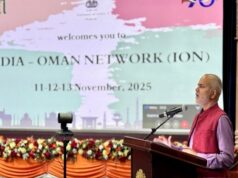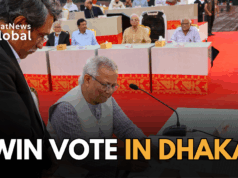Dr Amit Gupta, Senior Adviser to the Forum of Federations, believes India must adopt a more realistic view of its relationship with the United States and China. In an interview on The Gist, he said New Delhi continues to behave like “a jilted lover” seeking Washington’s attention while ignoring the limits of the partnership.
Drawing a sharp analogy, Gupta said, “We all know guys who were dumped by their girlfriend. They start dating other women but keep one eye on the old girlfriend, hoping she’ll ask them back.” India, he argued, does the same with the U.S. — interpreting every gesture, like a birthday wish from President Trump, as a sign of renewed affection.
He warned that despite all the fanfare over a ten-year defence agreement, Washington has offered no guarantees it won’t impose sanctions in the future or block technology transfers. “Ask anyone in Washington for that assurance and they’ll tell you — we don’t do that,” he said, noting that India still lacks access to critical technologies such as the electromagnetic catapult for aircraft carriers.
On Trump’s erratic diplomacy, Gupta described his comments about mediating between India and Pakistan as “a stream of consciousness” and said the real friction in trade talks is not agriculture but U.S. pressure on India to declare it won’t buy Russian oil. “Trump wants a headline — ‘I brought about a ceasefire’ — but he’s unpredictable,” Gupta said.
He dismissed talk of U.S. companies seeking to mine in Pakistan as “overhyped chatter,” adding that China, despite deep involvement, hasn’t been able to fully exploit those regions either. “Good luck to Trump and Western companies,” he remarked.
Gupta argued that Beijing views Pakistan’s ties with Washington pragmatically, accepting that Islamabad can engage both powers. “China will do everything to ensure Pakistan’s survival,” he said, “but not its prosperity.”
On China’s rise, Gupta noted that the country’s investments in manufacturing, robotics, and infrastructure have made it a global powerhouse, far ahead of India. “They have more highways than the U.S., more high-speed rail than the rest of the world combined, and massive power generation capacity to fuel AI,” he said.
As for India’s path, Gupta advised patience and pragmatism: “Do what Deng Xiaoping told the Chinese — bide your time, build your capabilities.” Instead of seeking symbolic validation from Washington, he suggested India focus on tangible collaborations in technology, pharmaceuticals, and education, where “the sky’s the limit.”
In a career spanning three decades and counting, Ramananda (Ram to his friends) has been the foreign editor of The Telegraph, Outlook Magazine and the New Indian Express. He helped set up rediff.com’s editorial operations in San Jose and New York, helmed sify.com, and was the founder editor of India.com.
His work has featured in national and international publications like the Al Jazeera Centre for Studies, Global Times and Ashahi Shimbun. But his one constant over all these years, he says, has been the attempt to understand rising India’s place in the world.
He can rustle up a mean salad, his oil-less pepper chicken is to die for, and all it takes is some beer and rhythm and blues to rock his soul.
Talk to him about foreign and strategic affairs, media, South Asia, China, and of course India.




